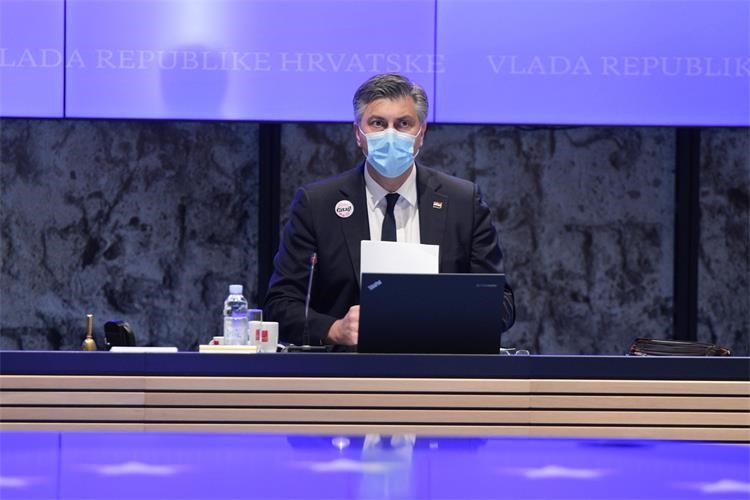- Published: 22.04.2021.
3,1 million vaccine doses will arrive by 30 June, senior citizens should get vaccinated as soon as possible
Prime Minister Plenković said at a government session on Thursday that as of 1 May, 230,000 doses of COVID-19 vaccines would be arriving in Croatia on a weekly basis, calling on citizens to register for vaccination.
The arrival of a larger quantity of vaccines during May and June would facilitate the process of vaccination.
Public health institutes have been instructed to include in the vaccination process all health institutions and private medical workers in the public health service network, and to organise, along with vaccination in family medicine offices, mobile vaccination teams and a sufficient number of vaccination points as well as to use civil protection, army and other resources in the process.
The vaccination plan for priority groups will be finished next week and the third phase of vaccination will begin, Beroš said.
So far, 902,670 vaccine doses have arrived in Croatia and 80% of them have been administered. A vaccination rate of above the average 14.2% has been achieved in age groups above 60, he said.
Prime Minister Andrej Plenković called on elderly people to register for vaccination, saying that a half of the country's adult population should be vaccinated by June 30.
"There will be enough vaccines, I call on all citizens to call their family doctors, register on the vaccination platform so that we can contribute together to health security," Plenković said.
"As many as 77% of people who have died of COVID-19 in Croatia since the start of the pandemic were aged above 70 and 93% were people older than 60. We call on all citizens who are above the age of 60, 70 to register for vaccination," the PM said.
The head of the national coronavirus crisis management team, Minister of the Interior Davor Božinović, said that there had been no changes to epidemiological restrictions at the national level, that existing restrictions had been extended, as had been most of those introduced by local crisis management teams.
Patriotism can't be contrary to tolerance of others
"Our duty is not to leave to oblivion and to condemn these horrific crimes committed on Croatian soil eight decades ago. And they were committed in the name of a fake conception of patriotism, which is never based on hate of others but love for one's own," Plenković said at a cabinet meeting on Thursday.
He said the lasting task was to develop a society in which love of country could not be contrary to tolerance of others and those who were different but the opposite.
"Our duty is to learn lessons from that dark period in Croatian history so that we can instill in young generations true patriotism and noble democratic values which guided the Croatian people in the establishment of an independent, sovereign and democratic state as well as in the defensive Homeland War."
The prime minister said Croatia could be proud with good reason that ethnic minorities had their representatives in parliament and were part of the ruling majority. That is a pledge for building a better and more open Croatia, which is the homeland of all its citizens, independently of their origin, he added.
"That's the best way to heal the wounds from the past and build a better future for young generations so that the mistakes from the past can never happen again."
Average pay more than HRK 7,000 first time ever
"According to the latest data from the State Bureau of Statistics, for the first time ever, the average net monthly wage in Croatia in February amounted to more than HRK 7,000. The tax reform significantly contributed to that as well as the strong jobkeeping measures that we adopted during the pandemic and thanks to which there were 17,000 more employed people at the end of March than a year earlier," said Plenković.
He underscored that from the outbreak of the pandemic the state had secured HRK 10 billion for about 120,000 employers and 680,000 workers who received support for wages.
The average wage increased by HRK 183 from January 2012 to January 2016 while from the start of 2016 until now it increased by HRK 1,396, he said.
The average take-home pay for those employed in legal entities in Croatia in February amounted to HRK 7,083 which is a real increase of 3.4% on the year, the State Bureau of Statistics data released on Tuesday indicates.
Compared to January this year the average net pay increased by a real 0.5%.
The median net wage in February amounted to HRK 5,791, meaning that half of the people employed were paid less and the other half more than this amount.
Text: HINA
